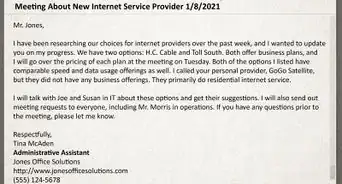This article was written by Mel Shipman and by wikiHow staff writer, Danielle Blinka, MA, MPA. Mel Shipman is a Certified Life Purpose Coach & Mindset Coach. With over seven years of experience, she specializes in helping women leaders and entrepreneurs achieve their goals by shifting their mindsets and self-limiting beliefs. Mel holds a BS in Biology from Bowling Green State University, two master’s degrees in Business Administration and Health Administration from Webster University, and is a doctoral candidate in Professional Coaching from The Monarch Business School Switzerland. She has also received her Life Purpose Coach Certification from the Rhema International Training Group and is credentialed through the Certified Coaches Alliance.
This article has been viewed 7,538 times.
You work hard, but it seems like your boss just doesn’t like you. Maybe they’re acting stand-offish, or perhaps you just get the worst assignments. It’s really stressful to deal with a disinterested boss, but their poor attitude may not have anything to do with you.[1]
X
Research source
In this article, we'll discuss common signs that a boss doesn't like you, along with other possible reasons for their behavior. We'll also share easy tips for winning over your boss no matter what situation you're in.
This article is based on an interview with our certified life purpose coach, Mel Shipman, owner of NextLevel Life, LLC. Check out the full interview here.
Things You Should Know
- Your boss may give you assignments no one wants. Talking to your boss and creating opportunities for yourself can help.
- Your boss might ignore you, snap at you, or micromanage you. Scheduling time to talk to your boss and taking initiative with your tasks may help.
- You may have trouble getting a raise or feedback. Documenting your achievements can help your boss see your value.
Steps
They treat you differently from other employees.
-
You probably don’t need to worry if your boss treats everyone the same. If you’re concerned that you’re being treated differently, check with your coworkers to see how they feel. Then, talk to your boss about what you’d like to happen moving forward. In that conversation, assure your boss that you’ll respect their preferences.[2] X Research source
- Say to coworkers, “Is Lu still doing weekly meetings with you?” or “Have you gotten any great feedback lately?”
- When you talk to your boss, say, “We haven’t been having regular meetings lately, and I was hoping we could get back to a regular schedule,” or “I really appreciate your feedback because I respect your knowledge and expertise. Would it be possible for me to get more direction from you moving forward?”
They don’t make eye contact.
-
Your boss might avoid eye contact because they’re busy or anxious. On the other hand, they could be avoiding eye contact because they don’t value your opinions. In general, making eye contact shows that you’re interested in what someone has to say and that you’re truly listening to them.[3] X Research source To be on the safe side, ask your boss how you can communicate with them in a way that respects their time.
- “I’ve noticed that you aren’t making eye contact. Have I come at a bad time?”
- “Does it bother you when I make eye contact? I want you to feel comfortable when I’m talking to you.”
They micromanage you.
-
You probably don’t need to worry if your boss micromanages everyone. That said, micromanagement can also be a sign that they don’t trust your work. If this is the case, it’s time to change their mind. Start by reassuring your boss that you’re just as attentive to the small details as they are. Then, suggest another way for them to monitor your progress without micromanaging.[4] X Research source
- You might do weekly check-ins with your boss to talk about your progress.
- You could also write progress reports every week.
They ignore you.
-
Your boss may be distant while they’re busy or dealing with a problem. On the other hand, it is possible that they're avoiding you because they aren't your biggest fan. If this is the case, you can repair your work relationship by improving your communication.[5] X Research source
- Schedule a meeting with them.
- Ask your boss what you can do to help them.
- Take on a bigger role at work.
- Send short, easy to answer emails when you need feedback.
They snap at you.
-
Your boss may be snapping at everyone because they’re stressed. That said, their negative attitude could possibly be a sign of a problem between you. It’s not too late to get on your boss’s good side by offering them help. Check in with your boss to see if they’re stressed, and ask if there’s anything you can do to support them.
- “You’ve seemed a little stressed out lately. Is there anything I can do to help?”
- “Are you doing okay lately? I’d be happy to help if you need it.”
They don’t give you feedback—or are super negative.
-
Some bosses struggle with giving feedback. In some cases, your boss may stop giving you feedback because they’re checked out. It's really frustrating to feel like you aren't getting proper attention from your boss, and you might even feel unvalued.[6] X Research source To fix this problem, talk to your boss about getting better feedback.
- If you want feedback, use the KISS method. Ask for one thing you should keep, one thing you should improve, one thing you should start, and one thing you should stop.
- If they often give you negative feedback, talk to your boss about what you need to do a better job.
- You might ask another employee to be your mentor so you can get good feedback. Pick someone who will benefit you the most, and validate their experience when you ask them.
They don’t ask for your input.
-
It’s hard when your boss doesn’t recognize all you have to contribute. To make them more open to your opinions, explain to your boss how you can help them look good so they’re more open to your input. Explain to your boss what you can do to help them reach their goals and impress their supervisors.
- “I’m really interested in the new project you’ve just started. I’d love to contribute my expertise.”
- “I worked on a similar project in my prior position. I’m happy to help you by contributing my input.”
They only give you work no one else wants.
-
Your boss may think you enjoy your work, so they keep giving you more. You could also be the only one who hasn’t complained about these tasks. To get better work assignments, you’ll need to impress your boss with your work. Go beyond the basics when you’re given a task, and be proactive in looking for new ways to benefit your organization using your skillset.[7] X Research source
- You might pitch a new project.
- You could volunteer to help a struggling coworker.
- If you finish a task early, use the extra time to help your boss.
They prefer to communicate over email.
-
Your boss might prefer email because they can take more time to think. If they’re communicating with everyone over email, this is likely the case. On the other hand, your boss might send you emails because they dislike talking to you. In this situation, give them the benefit of the doubt because their choice may have nothing to do with you.[8] X Research source
- Some people just communicate better in writing, and there’s nothing wrong with that.
- On the bright side, you’ll have a record of all the communications between your boss and you.
They don’t want to get to know you.
-
Your boss may avoid personal topics out of professionalism. At the same time, it’s possible your boss doesn’t care about your personal life. If you want to get to know your boss better, start a conversation with your boss about your personal lives, while still being professional. Ask them about their hobbies, interests, and other work-appropriate topics, like pop-culture.
- “Watch any good shows lately?”
- “What’s the last book you read?”
- “Are you a sports fan?”
- “How was your weekend?”
- “Where are you planning to vacation this year?”
They refuse to give you a raise and won't say why.
-
Your boss may not realize all the great work you’re doing. It's possible that your boss is withholding a raise because they don't like you, but it's more likely that your boss isn't fully aware of your achievements and contributions. To get that raise you deserve, focus on showing your boss what a valuable employee you are. Tell your boss what you’re working on and about the positive impacts you’ve had on your organization.[9] X Research source
- “Can I give you a rundown of the projects I’ve completed this year?”
- “I’m really proud of this report, but I’d love to have your feedback.”
- “Can we schedule a meeting to review my work over the last year and set goals for this coming year?”
You Might Also Like
 How to Write an Email or Letter to Your Boss
How to Write an Email or Letter to Your Boss






 14 Signs That Your Boss Is Sidelining You at Work (And What to Do about It)
14 Signs That Your Boss Is Sidelining You at Work (And What to Do about It)




 Top 14 Signs Your Boss Is Testing Your Abilities (And What to Do about It)
Top 14 Signs Your Boss Is Testing Your Abilities (And What to Do about It)

References
- ↑ https://www.cnbc.com/2010/12/07/20-ways-to-manage-your-boss.html
- ↑ https://www.northeastern.edu/graduate/blog/6-signs-time-change-careers/
- ↑ https://www.canr.msu.edu/news/eye_contact_an_introduction_to_its_role_in_communication
- ↑ https://www.workplacestrategiesformentalhealth.com/resources/dealing-with-a-stressful-boss
- ↑ https://www.canr.msu.edu/news/eye_contact_an_introduction_to_its_role_in_communication
- ↑ https://www.northeastern.edu/graduate/blog/6-signs-time-change-careers/
- ↑ https://www.fastcompany.com/3067743/how-to-create-your-own-opportunities-at-work
- ↑ https://www.workplacestrategiesformentalhealth.com/resources/dealing-with-a-stressful-boss
- ↑ https://www.cnbc.com/2010/12/07/20-ways-to-manage-your-boss.html
About This Article
























































